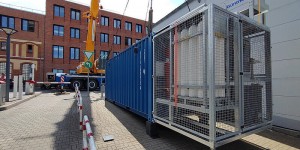From an Article by Sandra Enkhardt, PV Magazine, August 3, 2023
Germany-based Ostermeier H2ydrogen Solutions has developed a containerized solution to produce heat and hot water from hydrogen. It includes a photovoltaic inverter, a battery, a heat pump, a heat and cold buffer storage system, an electrolyzer, a compressor, and a fuel cell.
The Fulda University of Applied Sciences in Germany has developed a turnkey self-sufficient solution that supplies buildings with heat and electricity using hydrogen-based technology.
Munich-based Ostermeier H2ydrogen Solutions (OHS) built the system in accordance with the researchers’ specifications, fitting the entire technology within a shipping container. It includes essential components such as a photovoltaic inverters, batteries, heat pumps, heat and cold buffer storage, electrolyzers, hydrogen storage units, compressors, and fuel cells.
The solution uses a specially developed energy management system to adapt production to different scenarios, optimize renewable energy use, and support the grid.
“The aim of our research is to further develop the algorithms of our energy management system and to implement energy-optimized operation all year round,” said Ulf Schwalbe, a professor in the Department of Electrical Engineering and Information Technology at Fulda University of Applied Sciences and the head of the Electromobility and Renewable Energy research group.
OHS wants to give the “EcoreOne” container an externally attractive design for use in the living environment. It has already developed a modular system of decentralized storage solutions for larger industrial and residential building complexes, with a focus on the long-term storage of renewable electricity.
“The container for the Fulda University of Applied Sciences is a world first for us. I’m very excited about the practical insights that the research team will gain with it,” said OHS Managing Director Markus Ostermeier.
Since March, the container has undergone test operations at the OHS company premises in Schweiternkirchen, Bavaria. Recently, it was transported to Fulda and established there.
The forthcoming research work in Fulda aims to achieve several objectives. One goal is to extend the operational lifespan of heat pumps. The researchers also plan to enhance energy management solutions for efficient supply to both residential and industrial buildings. In addition, they will assess the system’s integration with the energy market and its capability for temporary storage of heat, cold, and power across diverse climatic and weather conditions.
The project has secured financial support from the European Regional Development Fund (Next Generation EU) and the Ministry for Science and Art of the German state of Hessia.

